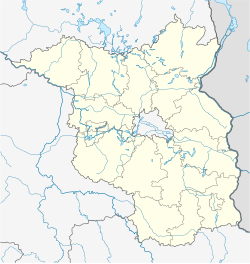Finkenkrug | |
|---|---|
 Location of Finkenkrug | |
| Coordinates: 52°33′48″N13°02′33″E / 52.56333°N 13.04250°E | |
| Country | Germany |
| State | Brandenburg |
| District | Havelland |
| Town | Falkensee |
| Elevation | 32 m (105 ft) |
| Population | |
• Total | 5,830 |
| Time zone | UTC+01:00 (CET) |
| • Summer (DST) | UTC+02:00 (CEST) |
| Postal codes | 14612 |
| Dialling codes | 03322 |

Finkenkrug is a district of Falkensee, a town west of Berlin. It has been named after Alten Finkenkrug, a tar furnace in the "Bredower Forst".

